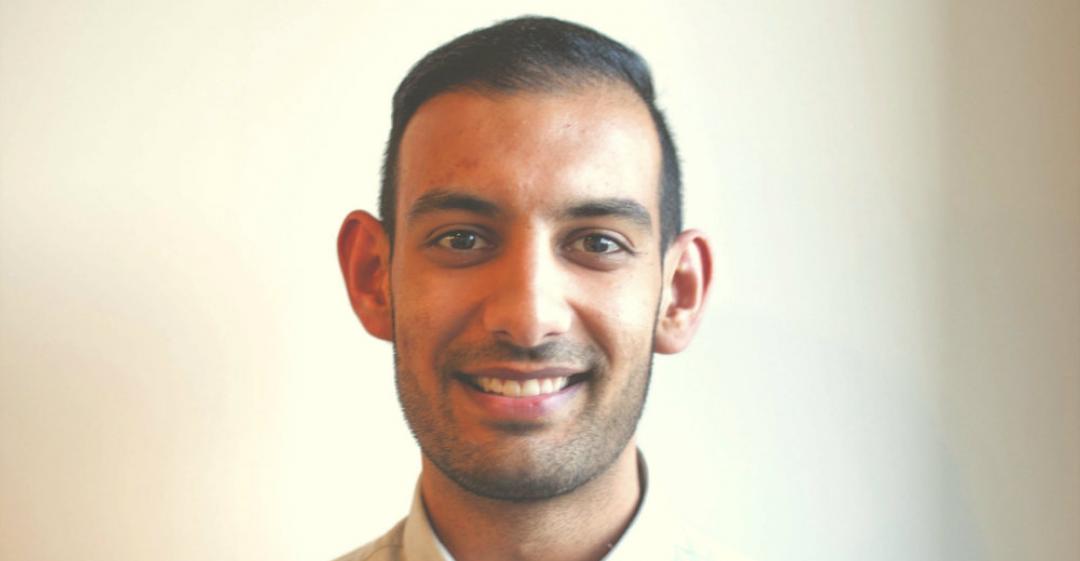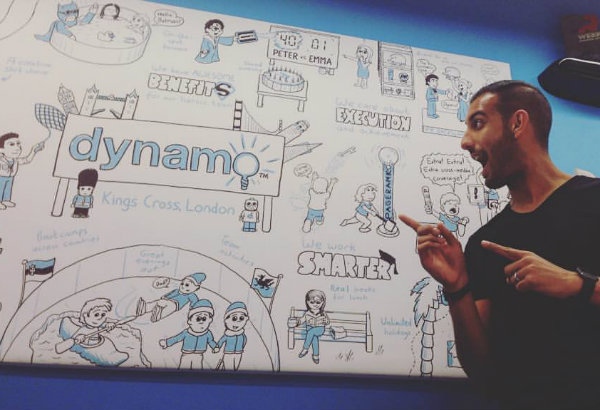“I didn't want to stay where I was just because it was the 'comfortable' option.”

What work were you doing previously?
I was a primary school teacher.
After studying Psychology at university, I 'fell' into teaching, staying in the classroom for a further three years after my training.
What are you doing now?
I'm now an Account Executive at Dynamo, a consumer technology PR agency.
Why did you change?
Honestly, even within the few years I'd been doing it, I could see the changes being made in the profession and didn't like the direction things were heading in.
I have huge respect for teachers that deal with the hours, expectations, micro-management and paperwork that is expected of them, in a job where all every good teacher wants to do is put the children first.
For these reasons, teaching isn't a job you can do half-heartedly; it requires genuine passion. As soon as I realised I didn't have that anymore, it was time to have a serious rethink.
Although I knew I was good at it, I didn't want to stay where I was just because it was the 'comfortable' option.
All I knew was that working with technology and people were my two key requirements, so I started looking into what jobs could offer me those on a more explicit level.
When was the moment you decided to make the change?
After investing five years in the job, I knew I had given it a fair shot.
I had to leave before I became too senior and it became too difficult to walk away from the responsibility and increasing payscales.
There were many things that put me off teaching, but I'd say there were an equal amount that drew me to PR. Whilst I had access to jobs like recruitment, where friends were earning a lot in commission and lived the city life I craved, it just wasn't what I was looking for.
I had an unplanned conversation with a friend who had worked in PR since graduating, and it immediately sparked my interest. She spoke about the networking, the lively office culture, the events and the general job role.
From there, I started looking up what the job actually entailed and exploring how I could make my love of technology a part of this. A few months into looking, I realised that working for a consumer technology PR agency ticked most of my boxes and the decision to change had been made for me.
Are you happy with the change?
I haven’t looked back once; I absolutely love what I do now.
I work with a team of around 27 people in a central London office. Granted, an office environment is some people's idea of a nightmare, but being surrounded by an energetic, creative and loud group keeps things interesting. It also helped that I wasn't treated as an intern, but given more responsibility.
The role itself keeps me on my toes; from day one I was writing, pitching, joining brainstorms and generally given a wide range of jobs across a range of client accounts that kept things fresh. I would be coordinating the hire of an industrial chiller for an event one day; the next, I would be at that same event testing out the latest gadgets alongside journalists and clients.
Working in a small / medium company also has its perks. You get to know everyone on a personal level, which is great as you often don't get that chance in bigger companies, or even in a school where you spend most of your time with the children.
What does this mean in the bigger picture? It means I am more than happy to put the extra hours in when necessary because I can see the impact it has on a client account. It means I am keen to meet targets and deadlines because I know I am contributing to a team. It means I'm interested in reading up on the world of technology outside of work hours, because not only do I know it will help with my work, but I love the topic.
What do you miss and what don't you miss?
I do miss the children sometimes, especially their own little developing personalities.
I mainly taught Year 5 (so around ten years old) and their understanding of sarcasm and humour was pretty good by then, with many being able to give it back to which me was fun.
I can't say I miss the marking – massively time consuming and tiring at the end of a day.
Most people leaving teaching would be very hesitant to leave the holiday allowance behind. After all, who wouldn't want 13 weeks of holiday? (Disclaimer: I guarantee no teacher takes all this time off, it was more like eight after you'd prepped for each new term.) However, my case is exceptional and somehow I've landed in a job that offers unlimited paid holidays. Yes it is crazy...and no I don't know how they can offer it.
How did you go about making the shift?
Once I had decided on PR, I searched through all the London-based firms I could find.
I then narrowed them down by speciality, mine being technology (although I was aware that I couldn't be too picky as I had no experience whatsoever in the field).
From here, I contacted somebody I'd once done some work experience with who happened to be quite senior in the industry. He gave me a few tips about how to approach an agency I was interested in.
Dynamo was the place I thought looked most interesting; it drew me in with its exciting website that alluded to an exciting environment. After reading up on their website and getting a feel for their kind of vibe, I applied both via their application form, as well as directly to one of the CEOs through LinkedIn, offering my services for a week over half term. I then met with the CEO for a drink, explained my situation and convinced him to temporarily let me through the door.
They got a cheap pair of hands for the week as an intern to help with all the small jobs. And I got a snapshot of what an agency was really like for a week, whilst not yet having to fully commit to it. If I'd hated it at this point I could have run back to teaching and been content.
It turned out I loved it.
I kept in contact with them and went back for a second week as an intern a few months later. By the end of that I was sold; I wanted in.
I kept in touch with the company over the next few months, during which I handed in my notice (with no promise of a job) and eventually left school at the end of the academic year (still with no promise of a job). Being a small company, their hiring process was quite tight; I had to wait for enough work to be there to actually get a job.
It got to the end of my holiday time and I had to work to bring money in again, so I supply taught, waiting for that call from Dynamo. Three days into it the phone rang and I started in PR the next day!
What didn't go well? What 'wrong turns' did you take?
Not much to be honest.
The biggest issue was quitting my job with no guarantee I was going to be hired by Dynamo. It wasn't a 'wrong turn', but it certainly wasn't the ideal situation to be in. Ideally, I would have had something lined up before I handed my notice in!
How did you handle your finances to make your change possible?
Interesting question.
My wife was just qualifying to be a solicitor as I was making my change. We basically switched earnings and carried on living the same lifestyle we had been. This was the main reason I was able to make the change at this time – any earlier and we would have earned too little between us; any later, we would have adjusted to the dual higher income, making it harder to leave.
This was partly lucky timing for me, but also the reasoning to do it whilst the opportunity was there. It would have been far easier to talk myself out of the switch the longer I left it.
Key takeaway here: if a chance presents itself, take it!
What was the most difficult thing about changing?
The money and the responsibility.
As with any job, you become more senior the longer you are in it, and you earn more too. I took a step back in both respects to move into my new field. This was of course hugely difficult to swallow, but after weighing it up and being in that new environment for two weeks, I knew I could make those sacrifices for the job satisfaction.
The lack of experience was also an issue. Many of the application forms stated you needed some sort of degree or relevant experience to even apply. I suspect this is a huge problem for many people making the switch. I found a small loophole by taking the role of intern and offering my services for free. Luckily my job allowed me to do this as I was paid over the holidays and therefore free to give up my time.
I also made a big deal of selling my transferable skills, such as organisation, planning, managing, public speaking and everything else teaching had provided me with, to make up for my lack of experience.
What help did you get? 
Aside from what was mentioned above (my senior contact in the industry, my wife qualifying, and Dynamo giving me a chance), not much!
Those factors were all crucial though, and likely without any single one of them I wouldn't have made it.
What have you learnt in the process?
Job satisfaction is everything.
Making the transition and taking some steps back in terms of pay and seniority now mean nothing to me as I enjoy my work every day.
What would you advise others to do in the same situation?
Put your interests at the centre of what you want to do.
When you find something you love, most other factors will seem less significant. I was extremely lucky in many senses, but I also used the resources I had to my advantage.
If you have free time at the weekend, find events to network with people in your chosen industry.
Scour LinkedIn for contacts to take out for a coffee and gain advice from.
Read blogs of people that have made a similar switch to you. It can help you realise things you didn't consider before.
Don’t rush into it. Take your time to find the right place and understand what you can offer them. If it is a two-way win, you are far more likely to be of interest to them.
Finally, don't expect it to happen overnight. It took me almost a year to the day from thinking of leaving teaching to starting at Dynamo.
What resources would you recommend to others?
Blogs like Careershifters and industry-specific ones for inspiration.
LinkedIn and social media groups for contacts as well as events for networking.
Also, use the people around you – you'd be surprised who knows whom when you start asking around.
What lessons could you take from Arun's story to use in your own career change? Let us know in the comments below.



